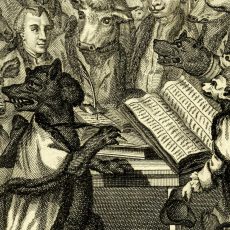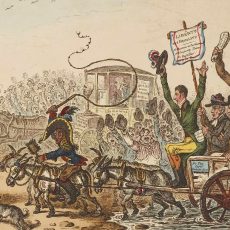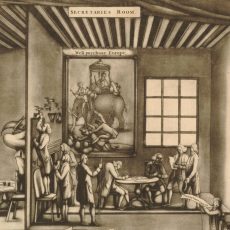May
1807
yorkshire
Contested
GENERAL ELECTION
Poll book data from:
Citation: County of York. The poll for knights… (York: T. Wilson & R. Spence, 1807)
Source: John Sims (ed.), A Handlist of British Parliamentary Poll Books (Leicester, 1984); Jeremy Gibson and Colin Rogers (eds.), Poll Books, 1696–1872: A Directory of Holdings in Great Britain (4th edn., Bury, 2008); L. W. L. Edwards (ed.), Catalogue of Directories and Poll Books in the Possession of the Society of Genealogists (4th edn., 1984).
Timeline & Key Statistics
Contexts & Remarks
Dates: Wednesday 20 May-Friday 5 June 1807.
Poll book reference: County of York. The poll for knights... (York: T. Wilson & R. Spence, 1807).
A copy held at the Bodleian Library has 'Robt. Smithson 1807' inscribed on the title page, who is possibly one of the three Robert Smithsons who appear within.
Candidates: William Wilberforce (Tory); Charles William Wentworth Fitzwilliam, Viscount Milton (Whig); and the Honourable Henry Lascelles (Tory). The 1807 Yorkshire election was the first to be contested since 1741.
William Wilberforce, the famous abolitionist, was a longstanding representative of Yorkshire in Parliament, having served as Knight of the Shire since 1784. Wilberforce's campaign for the abolition of the slave trade made him a favourite of Yorkshire's Methodist community. His election expenses in 1807 came in around £28,000 (most of which came from volunteers' donations), deriding the extravagance shown by Milton and Lascelles.
Charles Fitzwilliam, Viscount Milton, was the son of the earl Fitzwilliam (who inherited the estates and collieries of his uncle, the 2nd Marquess of Rockingham in 1782). Over the course of his son's campaign, Lord Fitzwilliam spent nearly £100,000. His campaign was largely supported by members of the cloth trade in the West Riding.
The Honourable Henry Lascelles was the son of Lord Harewood, who had served as MP for Northallerton in the second half of the eighteenth century. Henry Lascelles was a returning candidate, having been returned as Knight of the Shire since 1796. However, his attitude towards the regulation of the wool trade made him less popular with his constituents, losing him the 1806 general election. During the 1807 campaign, Lascelles spent over £90,000, drawing from family estates in Barbados.
The polling took place over a tense fifteen days at Castle Yard in York, which were punctuated by mobs and sideshows. Lady Bessborough recounted that Wilberforce led in the poll 'from mere weight of character in such an election as this, when money is supposed to do all. I hear Mr Lascelles says he wishes his father would give him the money instead of the seat'. Wilberforce's agents were active in getting his supporters to the polls, appointing election agents at the Tiger Inn and Beverley Arms to arrange for voters' transportation to York.
The Yorkshire Herald reported that, ''Nothing since the days of the revolution has ever presented to the world such a scene as has been for fifteen days and nights passing within this great county. Repose or rest have been unknown in it, except it was seen in a messenger, totally worn out, asleep upon his post-horse, or on his carriage. Every day the roads in every direction, to and from every remote corner of the county have been covered with vehicles loaded with voters; and barouches, curricles, gigs, flying wagons, military cars with eight horses to them, crowded sometimes with forty voters, have been scouring the country, leaving not the smallest chance for the quiet traveller to urge his humble journey, or find a chair at an inn to sit down upon' (Yorkshire Herald, 6 June 1807).
Wilberforce and Milton were returned as Knights of the Shire, though Lascelles petitioned the result. Lady Holland wrote that, 'A petition against Milton was ready, and upon the point of being presented, but he judiciously procured one also against Wilberforce, which, being held in terrorem, inclined Wilberforce to exert and pledge himself on behalf of ministers who came forward and promised to drop the petition against Lord Milton, if he in return would stipulate that the one against Wilberforce should be dropped'. Overall, this election was the most expensive election prior to the 1832 Reform Act.
Poll Book
Below is a digitised version of the poll book for this election:










